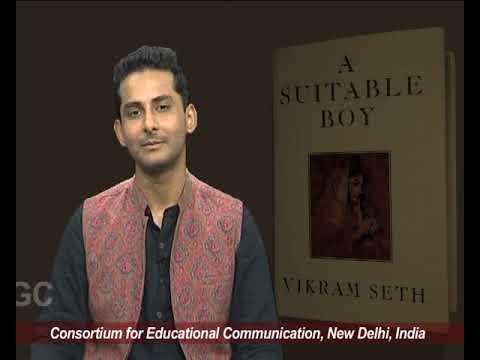A Suitable Boy by Vikram Seth (Part-IV)
Summary
TLDRIn this detailed lecture, the speaker provides an in-depth analysis of *A Suitable Boy*, covering key plot points from parts 1 to 19, character developments, and the central theme of marriage. The speaker contrasts the novel with its BBC adaptation, discussing how the series simplifies and condenses the complex narrative, focusing more on romantic elements while omitting the broader sociopolitical context. The lecture also explores the novel's realistic portrayal of post-independence India and sets the stage for future discussions on character analysis and the novel's realist approach. The speaker emphasizes the importance of reading the full novel for a deeper understanding.
Takeaways
- 😀 Haresh writes a heartfelt, humble letter to L, apologizing for past behavior and proposing in a simple, grounded manner.
- 😀 L chooses Haresh over Amit and Kabir after careful consideration, valuing calm, sustaining love over passionate infatuation.
- 😀 Arun’s letter critiques Haresh’s social status, job, English skills, and family background, but L still follows her heart.
- 😀 The trial of Man Kapoor is resolved when Fose takes the blame for the knife incident, leading to Man's acquittal.
- 😀 The novel concludes with the wedding of L and Haresh, and Von Mehra’s rise as a confident IAS officer, while Malti shows interest in Von.
- 😀 Vikram Seth’s novel deeply balances personal, romantic, and socio-political narratives, exploring post-independence India, land reforms, communal tensions, and family dynamics.
- 😀 The BBC web series adaptation condenses the story, emphasizing romance and central plot points, while omitting much of the political and social context.
- 😀 Character development in the novel is rich and detailed, with minor characters playing crucial roles; the web series simplifies some characters and subplots.
- 😀 The novel’s ending is open-ended and nuanced, reflecting L’s internal conflicts and societal pressures, while the web series provides a more definitive conclusion.
- 😀 Future lectures will focus on detailed character analysis and Vikram Seth’s method of narrating India realistically through his novel.
- 😀 Reading the unabridged novel is essential to fully grasp the depth of characters, socio-political context, and complex narrative, which the web series cannot fully capture.
Q & A
How does Haresh's proposal to L differ from Amit's proposal in the novel?
-Haresh's proposal to L is subtle, simple, and grounded, contrasting with Amit's flamboyant and poetic proposal. Haresh proposes in a more understated manner, while Amit uses a specially inscribed poem to express his feelings.
What role does Arun's letter play in L's decision-making process?
-Arun's letter helps L come to a quick decision regarding her marriage. Arun criticizes Haresh, pointing out his flaws and arguing that L should not marry him. This prompts L to make up her mind and accept Haresh's proposal.
Why does Malti disagree with L's decision to marry Haresh?
-Malti believes that L is making a mistake by choosing Haresh, as she thinks it will not be a good match. L, on the other hand, justifies her choice by recognizing that her connection with Haresh is more genuine and stable compared to her infatuation with Kabir.
What does L's narration of the Arthur Hugh Clough poem reveal about her understanding of love?
-The poem illustrates two types of love: one that is exciting and unsettling, and another that is calm, steady, and supportive. L realizes that she wants the latter type of love, which she believes she can only find with Haresh, not with Kabir or Amit.
What is the significance of Fose's intervention in Man Kapoor's trial?
-Fose's intervention is significant as it absolves Man Kapoor of the crime he had confessed to. Fose claims that the stabbing was an accident, leading to Man's acquittal and highlighting themes of redemption and truth.
What transformation does Vun undergo in Part 19 of the novel?
-Vun evolves from a timid and shy boy into a confident individual after clearing his preliminary exams. His increased social status also makes him a more attractive prospect, particularly in the eyes of Malti.
How does Mrs. Rupa Mea's perspective on marriage evolve in Part 19?
-In Part 19, Mrs. Rupa Mea reflects on her earlier statement that she would let L choose her own husband. She repeats this sentiment to Vun, showing how the theme of marriage comes full circle and is central to the novel.
What is the primary focus of the BBC adaptation of *A Suitable Boy*?
-The BBC adaptation of *A Suitable Boy* simplifies and condenses the novel, focusing more on the romantic elements of L's relationships with Haresh, Amit, and Kabir, while omitting significant socio-political themes like land reforms and communal tensions present in the book.
How does the web series adaptation differ from the novel in terms of character development?
-In the web series, certain characters, particularly Haresh and Amit, are less developed compared to the novel. Haresh's internal conflict and importance in L's decision-making are reduced, and the intellectual bond between L and Amit is not explored as deeply as in the book.
Why is it important to read the unabridged version of *A Suitable Boy* rather than just relying on the web series?
-The unabridged version of *A Suitable Boy* offers a much richer understanding of the novel's characters, political context, and social dynamics. The web series, due to time constraints, simplifies many aspects and omits significant details that contribute to the depth and realism of the novel.
Outlines

此内容仅限付费用户访问。 请升级后访问。
立即升级Mindmap

此内容仅限付费用户访问。 请升级后访问。
立即升级Keywords

此内容仅限付费用户访问。 请升级后访问。
立即升级Highlights

此内容仅限付费用户访问。 请升级后访问。
立即升级Transcripts

此内容仅限付费用户访问。 请升级后访问。
立即升级5.0 / 5 (0 votes)






